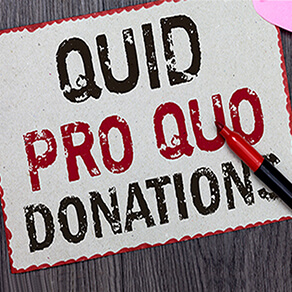
For Nonprofits, Quid Pro Quo Isn’t a Simple Exchange
Quid pro quo donations occur when a not-for-profit receives a payment that includes a contribution and the organization provides the donor with goods or services valued at less than the contributor’s payment. Among other things, these arrangements create reporting obligations for your nonprofit. And if you don’t meet these obligations, the IRS could assess financial penalties.
Give Written Notice
Quid pro quo rules apply if your nonprofit receives a donation of more than $75 and you provide a benefit to the donor. In such cases, give written notice to donors that they can deduct only the amount in excess of the value of the goods or services they receive in return. Also provide donors with a good faith estimate of the value of the goods or services provided in return.
This written acknowledgment must be provided when a donation is solicited or when it’s received. For example, if you’re holding a charity dinner, each ticket sold should disclose the tax-deductible portion of the ticket price. Additionally, the disclosure must be in a readily visible format — in other words, no small print. Examples can be found in IRS Publication 1771, “Charitable Contributions — Substantiation and Disclosure Requirements.”
Put a Price on Goods and Services
Before you can inform donors of the value of goods or services, you must put a price on them. Let’s say your nonprofit hosts a dinner for top donors at a high-end restaurant and pays for their meals. The donors then make large gifts. Here, determining value is fairly simple. The amount your organization paid for the meal would be considered the fair market value, and only the amount of the contributions in excess of this value would be tax-deductible for the donor.
But what if your charity sponsors a gala dinner at a hotel with live music where the hotel discounts the food and the band performs gratis — both as contributions to your organization? To establish the value to be reported to donors, determine what it would cost someone to attend a similar event. In this instance, you’d need to research comparable costs at local hotels for a dinner with entertainment. Or you could ask the hotel and band to tell you what they normally charge customers that aren’t charities.
For donated auction items, ask what a willing buyer would pay for them in an “arm’s length” transaction — that is, in the marketplace. Report each item’s value on the item bid cards.
Note Exceptions
You don’t need to provide a donor with written notice if a donation qualifies as a “token exception” — for example, you give the donor an inexpensive item such as a coffee mug with your charity’s name on it. Exceptions also exist when certain membership benefits and religious benefits are exchanged. If you’re unsure about whether donations are considered quid pro quo, contact us.
